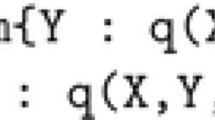Abstract
Answer set optimization (ASO) is a flexible framework for qualitative optimization in answer set programming (ASP). The approach uses a generating program to construct the space of problem solutions, and a preference program to assess the quality of solutions. In this short paper we generalize the approach by introducing aggregates in preference programs. This allows the user to express preferences which are based on minimization or maximization of some numerical criteria. We introduce the new language of preference programs, define its semantics and give an example illustrating its use.
Access this chapter
Tax calculation will be finalised at checkout
Purchases are for personal use only
Preview
Unable to display preview. Download preview PDF.
Similar content being viewed by others
References
Brewka, G., Niemelä, I., Truszczynski, M.: Answer set optimization. In: Proc. IJCAI, pp. 867–872 (2003)
Brewka, G.: Logic programming with ordered disjunction. In: Proc. AAAI, pp. 100-105 (2002)
Faber, W., Leone, N., Pfeifer, G.: Semantics and complexity of recursive aggregates in answer set programming. Artificial Intelligence 175(1), 278–298 (2010)
Faber, W., Leone, N., Pfeifer, G.: Recursive aggregates in disjunctive logic programs: Semantics and complexity. In: Alferes, J.J., Leite, J. (eds.) JELIA 2004. LNCS (LNAI), vol. 3229, pp. 200–212. Springer, Heidelberg (2004)
Foo, N., Meyer, T., Brewka, G.: LPOD answer sets and nash equilibria. In: Maher, M.J. (ed.) ASIAN 2004. LNCS, vol. 3321, pp. 343–351. Springer, Heidelberg (2004)
Pelov, N., Denecker, M., Bruynooghe, M.: Well-founded and stable semantics of logic programs with aggregates. TPLP 7, 355–375 (2007)
Sakama, C., Inoue, K.: Prioritized logic programming and its application to common-sense reasoning. Artificial Intelligence 123(1-2), 185–222 (2000)
Schaub, T., Wang, K.: A comparative study of logic programming with preference. In: Proc. IJCAI, pp. 597-602 (2001)
Author information
Authors and Affiliations
Editor information
Editors and Affiliations
Rights and permissions
Copyright information
© 2011 Springer-Verlag Berlin Heidelberg
About this paper
Cite this paper
Saad, E., Brewka, G. (2011). Aggregates in Answer Set Optimization. In: Delgrande, J.P., Faber, W. (eds) Logic Programming and Nonmonotonic Reasoning. LPNMR 2011. Lecture Notes in Computer Science(), vol 6645. Springer, Berlin, Heidelberg. https://doi.org/10.1007/978-3-642-20895-9_21
Download citation
DOI: https://doi.org/10.1007/978-3-642-20895-9_21
Publisher Name: Springer, Berlin, Heidelberg
Print ISBN: 978-3-642-20894-2
Online ISBN: 978-3-642-20895-9
eBook Packages: Computer ScienceComputer Science (R0)




